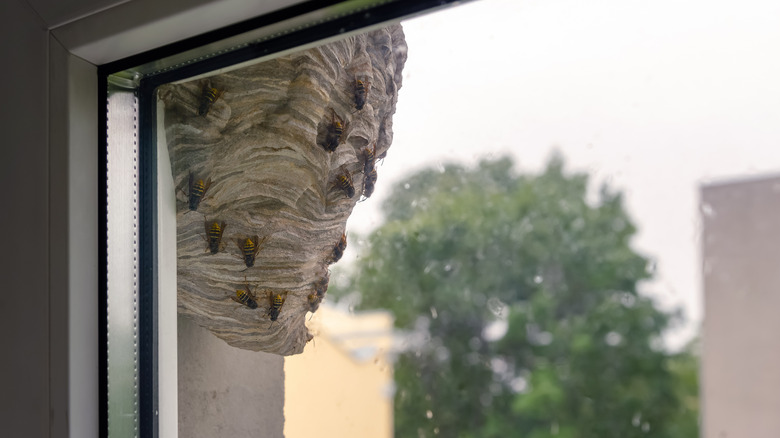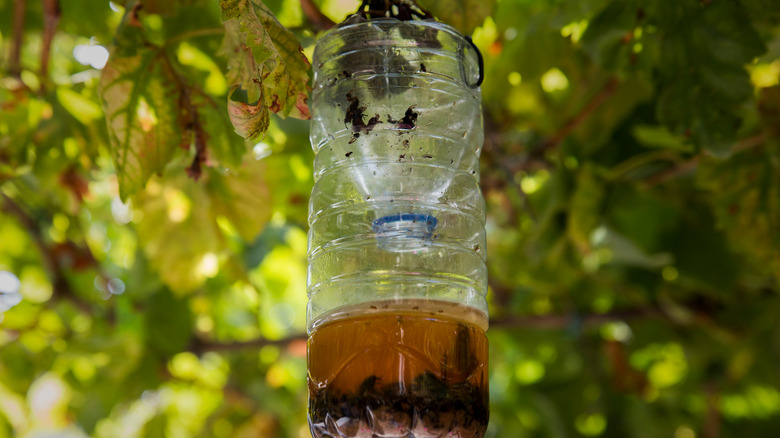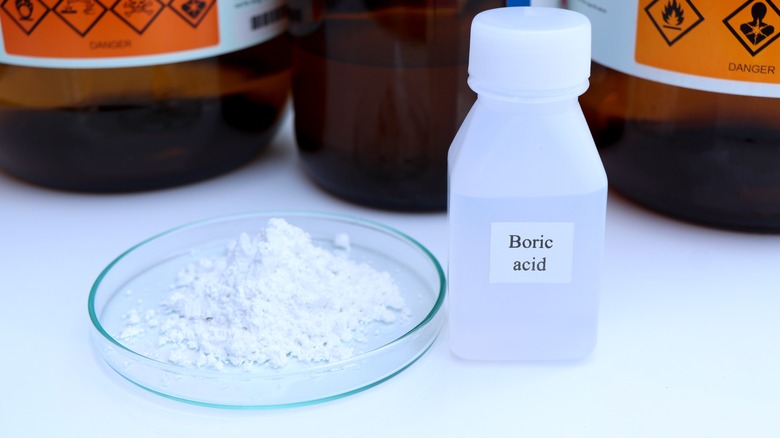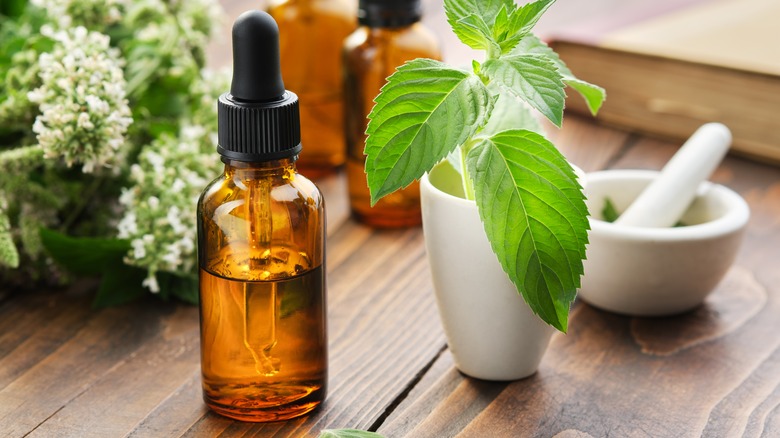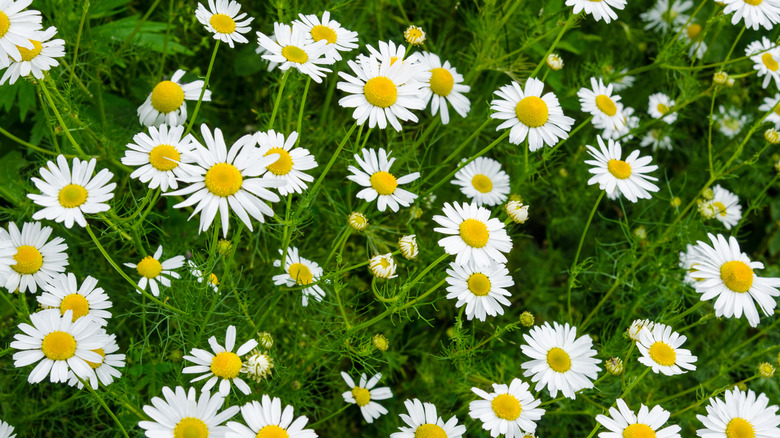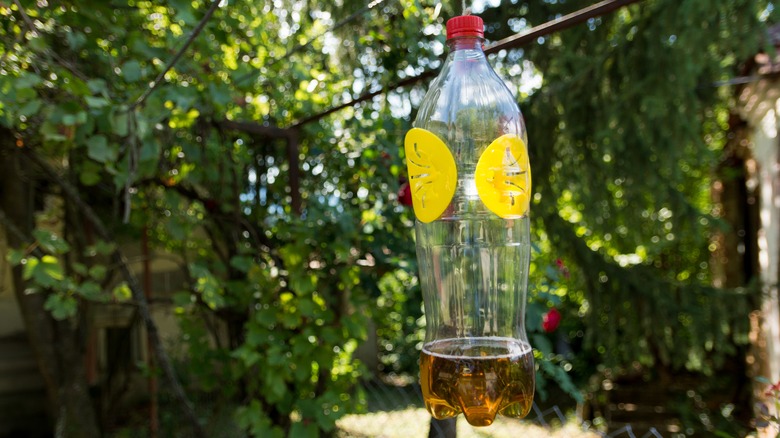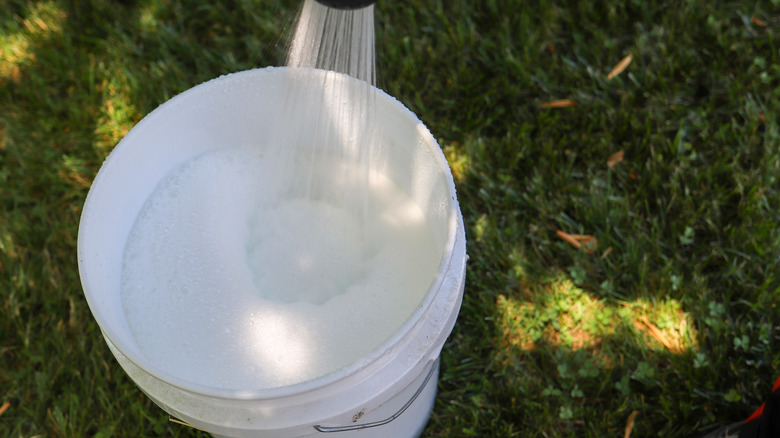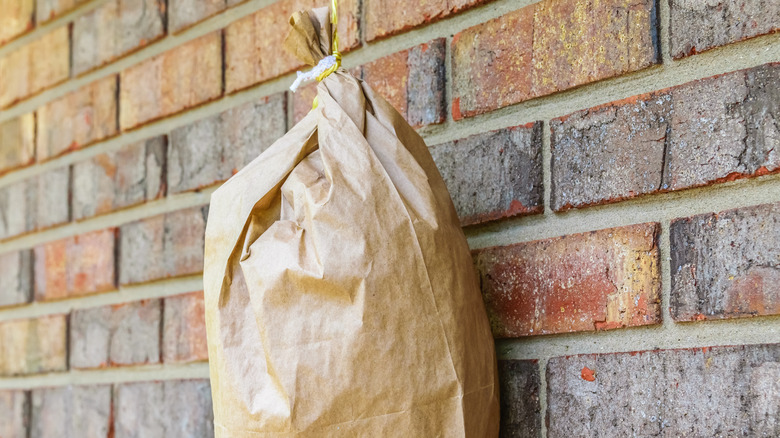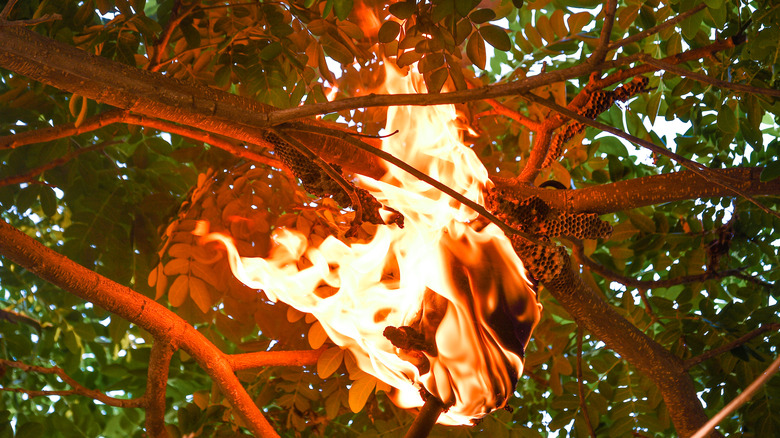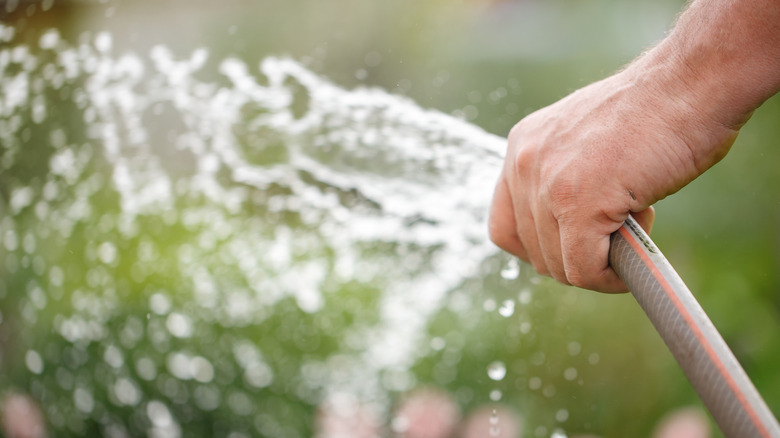Easy Hacks That Work To Get Rid Of Wasps (& 3 To Avoid)
As winter shifts into spring, you may be spending more time outside enjoying the weather or getting your garden ready. Unfortunately, we aren't the only ones eager to start our outdoor routines. Although wasps are most active in the summer, their queens emerge from hibernation at the beginning of spring to make their nests. You likely don't want to share your home with wasps, so it's crucial to know what to do when their nests inevitably pop up around your house.
Thankfully, there are a few methods to help prevent these unwelcome visitors and reduce suitable areas for wasps to start building. Keep most insects away by removing their food sources. Tightly seal trash cans, store pet food in storage bins, promptly wipe up any spills, and regularly clean your home and outdoor eating areas. By eliminating foods, you'll reduce the appeal of your home, making it less attractive to insects. It's also crucial to keep compost piles and tree branches away from the house, as both are ideal habitats for wasp nest building. Even if you do everything right, there's still a chance you'll come across these pests. If you use any of the hacks below, ensure you use precautionary measures while doing so. Wear protective clothing to prevent stinging as much as possible. Only attempt these methods during cooler hours of the day, before the sun rises or after the sun sets, when wasps are least active.
DIY a wasp trap
Making a DIY wasp trap is easier than you'd think, and there's a good chance you have everything you need in your kitchen. Several different concoctions will do the job, but the key to the effectiveness lies in the shape of the bottle. You'll begin by cutting a plastic bottle in half. Any size will work, though a bigger container is ideal. Flip the top side upside down and place it in the bottom half to create a funnel. Punch holes in the sides towards the top and use string or a piece of wire so you can hang it where you've seen the wasps. The bait will lure the wasps in, and once inside, it'll be almost impossible for them to find their way out.
We'll discuss a few bait options in this article, but one you can try comes from Utah State University. They suggest using a mixture of 1 part fruit juice to 10 parts water, a chunk of ripe fruit, 1 teaspoon of yeast, and a few drops of liquid soap. Mix it all together and add it to the bottom of the bottle. There should still be at least an inch of room between the liquid and the funnel hole to allow the bugs to buzz around. Otherwise, they'll drop down to grab some food before flying away well-fed and untrapped.
Make a boric acid solution
Wasps are not only annoying but can be dangerous to deal with if you have an allergy. Luckily, you can use boric acid to get rid of an infestation. While you can use the same bottle system we discussed with the last hack, this method works best if they can escape. The wasps will catch a whiff of the sweet-smelling nectar, leading them to come in contact with the boric acid. Once the wasps get their drink and leave, they'll carry traces of the boric acid back to the nest. As it gets introduced to the colony, it'll disrupt their stomachs and affect their nervous systems. Ideally, the whole colony will eventually die out over time, allowing you and your family to relax outside again peacefully.
Because you want the wasps to share the boric acid with their housemates, you'll need a container they can easily get out of. Use plastic cups or old bottles and cans with the tops cut off to hold the bait. Throw in a straw or stick so they can easily crawl in and back out. Mix one cup of something sweet like juice or sugar water with 2 tablespoons of boric acid. Because the goal isn't to submerge the wasps, this mixture should be enough to use in several cups. Place the containers in areas where you've noticed wasp activity. If you start noticing they aren't coming around as much, it's a good sign the bait is working.
Repel wasps with essential oils
Essential oils have several benefits, though they're most famous for aromatherapy. You can use citrus scents to fill your home with a clean fragrance or add lavender to a diffuser to help lull you to sleep. While we may love breathing them in, wasps don't get the appeal. According to a PubMed study, 17 of the 21 essential oils they tested worked well to repel yellowjackets and paper wasps. The oils that worked included some common concentrations like clove, lemongrass, lavender, and peppermint. They even found that certain combinations of these oils, like a mix of clove, geranium, and lemongrass, completely stopped the wasps from being attracted to the traps.
To make a deliciously smelling wasp repellant, Innovative Pest Solutions suggests mixing 10-15 drops of peppermint essential oil with water in a standard-sized spray bottle, like this one on Amazon. Spray generously around doors, windows, and any other areas you believe wasps may try to sneak their way into. If you want more of a citrusy fragrance for the summer, use lemongrass, orange, or grapefruit essential oils instead for the same effect. Respray after windy or rainy days or when you notice the intensity of the scent dying down to ensure it's potent enough to keep the pests away.
Grow wasp-repellant plants
Another way to use scents to prevent wasps is to plant fragrant flowers and herbs around your garden. Although wasps are pollinators, there are certain species they can't stand, causing them to fly the other way. Roman chamomile works as a natural wasp repellant and produces daisy-like blooms that carry a sweet fragrance throughout the backyard. Instead of using peppermint essential oils from the last hack, you can also grow the herb in your windowsills or outdoor areas. Not only does it have a fresh scent, but it's a flavorful herb you can use to spice up your water or add to certain dishes. Other wasp-repelling plants include lavender, basil, marigolds, rosemary, wormwood, lemongrass, and chrysanthemum. Choose as many as you like to have a stunning garden that doubles as wasp prevention.
Before you purchase plants or seeds, make sure you have the proper lighting for the species you choose. Basil, peppermint, and rosemary can thrive outside in the sun or indoors as long as you have a sunny window for them to sit in. Roman chamomile prefers bright sunlight, though you can get away with planting it in areas with partial shade. Marigolds come in several warm colors, like orange, yellow, red, gold, copper, and brass, and require full sun to grow their best. As a bonus, Roman chamomile and marigolds attract beneficial pollinators like bees, butterflies, and hummingbirds.
Use vinegar to keep wasps away
While humans and wasps may disagree on certain scents, we can all agree that vinegar isn't a pleasant smell. Whether you have white or apple cider vinegar, there are a couple of methods you can use to prevent and take care of your wasp problem. If you have apple cider vinegar, you'll only need a few other supplies to make wasp traps. Take an old soda bottle and fill it up about 1/4 of the way with the vinegar. Add in some sugar to give it a sweet smell and taste, along with a couple of drops of dish soap. Gently stir so that bubbles don't arise. The sugary fragrance will attract them to the liquid, the soap catches them, and the vinegar will kill them. This is also an effective mixture for other insects like fruit flies.
Another way to keep wasps away with vinegar is to add equal parts white vinegar and water to a spray bottle. Because they dislike the scent, you can spray this around your home to keep them from wanting to stop by. Apply the solution in common nesting areas or places they may enter, such as windows, doorways, attic, vents, and gutters. While spraying the pests or dousing a wasp nest with the harsh-smelling spray may be tempting, it's not a good idea. White vinegar may be repulsive to these angry insects, but it doesn't kill them. Instead, it could just irritate them, putting you at risk for attack.
Prevent wasps with WD-40
Most people have cans of WD-40 around the home to lubricate moving components, quiet squeaky hinges, and help prevent rust. What you may not know is that this handy product can also aid you with your wasp problems. The slick solution makes it impossible for wasps to build their nests in their favorite spots. Although it can cause some digestion issues if pets ingest it, it's relatively non-toxic and safer to use around kids and animals than standard wasp repellants with harsh chemicals. Because it serves so many household purposes and sells for under $10 a can, it's a cost-effective solution that allows you to get more bang for your buck.
The best time to employ this hack is during the spring before the queen wasps have set up their shelter. Start by cleaning the common areas where wasps tend to nest, like under eaves, roof overhangs, windowsills, and other sheltered spots around your home's exterior. Then, spray WD-40 liberally in each spot. Once she inspects the area to build, she'll soon realize it's much too slippery and move somewhere away from your house. You may need to reapply occasionally to keep it lubricated enough, especially after heavy rainfall.
Drown wasps with soapy water
There's nothing quite as stressful as being stuck in the house with a wasp following your every move. Attempting to walk up to it and squash it isn't just terrifying, but also isn't the best idea. If you take too long, swat at it, or miss hitting it, it'll get angry and be more apt to sting you. Luckily, this genius two-ingredient hack allows you to drop the wasp without having to get too close to it. Aside from soapy water, you'll need a water gun. The dish soap thins the water enough to allow it to penetrate its exoskeleton, which helps to drown it.
Fill a bucket with hot water and mix in about half a bottle of dish soap. Stir it thoroughly until it gets foamy. Then, dunk your water gun into the bucket to fill it up as much as you can. Now, you have the ideal weapon for taking out the stinging pests. You can also use the water gun to take out smaller wasp nests, though you'll need to be extra careful when doing so. Only approach their home when they're less active, and the sun isn't out, and wear protective clothing. Shoot at it several times until you've attacked the entire colony.
Hanging a brown paper bag may not be effective
You may have heard that hanging a brown paper bag can be an effective way to keep wasps from building nests on your house. The theory makes sense; wasps are territorial and don't want to keep their colony next to an already-existing one. So, they buzz around the artificial nest, assume there's competition there, and move to a better spot. Does hanging a brown paper bag deter wasps, though? Although the false nest idea makes sense in theory, it's not a foolproof method of keeping them away. Even worse, the wasps may see right through the trick and instead use the bag as a building material. Wasps have a keen sense of smell, so they can likely sniff out the difference between real nests and fakes.
If you're looking for a more natural wasp deterrent, your best bet is to use one of the other hacks mentioned above. Plus, hanging wasp-repelling plants look a lot better than a brown paper bag attached to a string. However, if you're curious to give it a try, there's no real harm that will come from attempting it. Some anecdotal evidence suggests it works for some people, so it's possible that certain species fall for the trick. Without proper scientific research, however, it's hard to say whether it actually works for those who swear by it or if it's simply a coincidence.
Don't burn a wasp nest
Dealing with wasps will have nearly anyone willing to do whatever it takes to get rid of them. At some point, you may have even considered lighting a match and setting the entire thing on fire. While it seems fair that the small insects can't survive their house being ablaze, this is one of the worst things you can do. It's possible that a few may go up in flames, but it's the rest you'll need to worry about. More likely than not, it'll anger the colony, prompting them to attack you instead. Additionally, setting anything on fire near your home can be extremely dangerous. Fire can easily get out of control, which could leave you with serious burns or even lead to burning down your property.
Rather than burning the wasp nest, consider using other hacks to take care of your wasp problem. If you've noticed an extreme amount of activity or have more nests than you know what to do with, your best bet is to hire an exterminator. Dealing with these creatures can be extremely dangerous. Unlike bees, wasps can sting you several times, and don't feel the least bit bad about it. Professionals can eliminate the colony without putting you, your family, and your property at risk.
Avoid using plain water to drown the nest
If you've noticed holes in the ground where wasps frequently fly in and out of, it's likely a species that builds underground nests. At first glance, it may seem like a good idea to just stick the hose down and blast them with water. Believe it or not, some of these enclosures are as deep as a foot and can be quite expansive. Unfortunately, the soil will soak up the water faster than you'd think, giving wasps ample time to escape. This will irritate the wasps, and you'll be their immediate target once they emerge from their flooding home.
As previously mentioned, the key to drowning wasps lies in using soapy water to ensure it penetrates their exoskeleton. Get a mesh piece of fabric and lay it over the hole with the wasp activity. Secure it in place with landscaping pins so it doesn't move when the water flows over it. Using this barrier will ensure the soapy water finds them without allowing them to escape and seek revenge. Mix a bucket of soapy water and pour it directly over the fabric. Another option is to squirt the dish soap over the fabric and use the hose directly after it. This method will effectively drown the wasps without putting you at risk of getting attacked.
